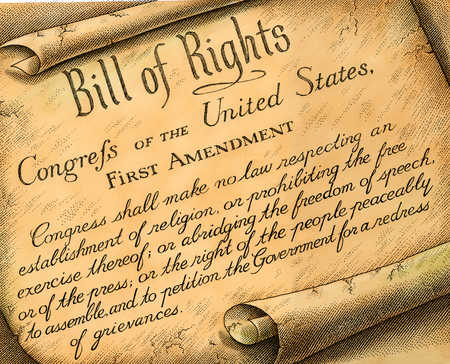Have you heard it before? On Facebook, Twitter, YouTube–any social media, really: by responding to a comment you are violating First Amendment rights. Some way, somehow, at some point, it’s almost guaranteed that a person on the internet who–gasp!–has an opinion will be accused of impinging on another’s inalienable rights on constitutional grounds. It remains interesting to see the patterns that emerge regarding which specific context and content is targeted, to varying degrees, and subjected to what appears to be a Get-Out-of-Jail-Free Card. Largely misappropriated by jerkholes, “Freedom of Speech” doctrine is twisted in attempts to render their comments exempt from criticism.
If you’ve ever wondered if you’re honestly impinging on someone’s rights by challenging passive-aggressive attacks; you’re not.
The First Amendment of the Constitution of the United States of America goes like this:
Congress shall make no law respecting an establishment of religion, or prohibiting the free exercise thereof; or abridging the freedom of speech, or of the press; or the right of the people peaceably to assemble, and to petition the government for a redress of grievances.
Now, what all that fancy-pants Standard English is saying is that the U.S. Government is never allowed to tell people what they can and can’t say, nor are they allowed to institute laws that censor people or censor the media. (Whether this doctrine is actually adhered to is another story.) “Media” includes internet access, because the ‘press’ in the Amendment has grown to larger and larger scales, expanded vastly, and while traditional print newspapers and magazines still exist, the way we consume ‘ The Press’ is no longer predominantly through print–it’s through websites and personal blogs, Facebook and Instagram, a general multitude of sources within the technological ether to choose from at individual discretion.
Invoking the First Amendment’s right to Freedom of Speech is often implemented at protests because it (is supposed to) protect assembled dissent. That’s on a macro-scale; Social Media attacks are on a micro-scale. They are micro-aggression, part of the type of abuse us LGBTQIA+ folk, along with other marginalized demographics and those whose intersections embodying both, face daily. Tactics used to silence and censor, to center oppression thinly veiled as taking a ‘Devil’s Advocate’ stance. (It should be noted that much of the terrible hate speech defended by invoking the First Amendment often come directly from MRAs.)
Blocking someone is not invading peoples’ rights. Neither is disabling comments.
Challenging what ‘Devils Advocates’ have to say is not invading peoples’ rights. Neither is asserting that they need to either cease such behavior or get off of your page.
Engaging someone who has argued in favor of oppressive views is not invading peoples’ rights. Neither is disengaging them.
Yes, even if it is done so publicly, whether through comments or any other public platform.
Having an opinion expressed on the internet, especially when expressed by marginalized demographics, isn’t taking away anyone’s rights–even if it is incorrectly framed as such. Sure, they have the Constitutional right to say whatever they please to whomever they please (using this right for harassment, mostly); and, thus, you have the right to respond however you’d like to whomever you please on the same constitutional grounds.






